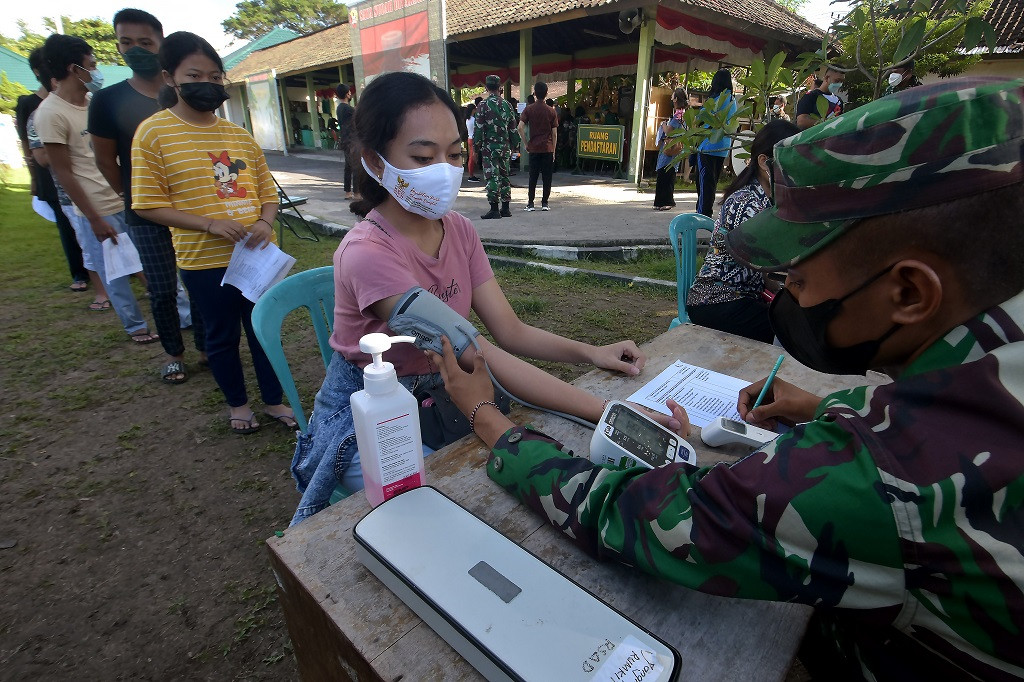Popular Reads
Top Results
Can't find what you're looking for?
View all search resultsPopular Reads
Top Results
Can't find what you're looking for?
View all search resultsDiscriminating against the unvaccinated
As the national vaccination program progresses, it becomes clearer that a sizeable portion of the population is still refusing to get vaccinated even though they have access to a vaccine
Change text size
Gift Premium Articles
to Anyone
J
akarta leads the nation in introducing various policies to persuade people to get vaccinated and help bring the COVID-19 pandemic under control. Some of these policies smack of discrimination against people who are not vaccinated but unlike mandatory vaccination, they do not necessarily violate human rights.
Visiting malls and shopping centers require you to show proof of vaccination — either for the first jab or both jabs — in Jakarta, Bandung in West Java, Semarang in Central Java and Surabaya in East Java under current public activity restrictions (PPKM). Jakarta has even made vaccination a prerequisite for receiving government assistance under various social safety net programs.
The Jakarta administration has claimed that the capital is nearly at herd immunity (defined by a threshold proportion of 70 percent of the population), with 8.5 million people having received their first jab against a target of 8.8 million. Access to vaccines is not a problem, unlike in most other parts of the country.
With that in mind, Jakarta has imposed policies that may be seen as discriminatory against the unvaccinated. Some discrimination is unavoidable to protect the health of the larger community, so the argument goes.
Some of these policies had already been put into practice, such as the mandatory proof of COVID-19 tests for taking public transportation within the city or between cities, and the requirement to wear face masks in public places. What's more, Indonesians cannot travel to certain countries because we got a vaccine that is not widely recognized. Targeted discrimination in the name of the health and well-being of the larger population is not a novelty in the ongoing pandemic.
As the national vaccination program progresses, it becomes clearer that a sizeable portion of the population is still refusing to get vaccinated even though they have access to a vaccine. Many people are still not convinced that COVID-19 exists, let alone the need for a vaccine against it. They now find themselves at the wrong end of targeted discriminatory policies.
One indicator of the prevalence of anti-vaxxers is that among the elderly, only 15 percent of the 21.5 million people aged 60 and older are fully vaccinated. This is one of the three groups that received first priority, along with health workers and those working in public services, when the government rolled out its vaccination program in January. In comparison, the vaccination rate is already 100 percent for health workers and 80 percent for public service workers. Since June, vaccination is open to everyone 12 years of age and older.
While anti-vaxxers could sabotage the campaign to curb COVID-19, the pushback will likely be harder if the government makes vaccination obligatory, as some top officials have earlier suggested by invoking the 2018 Health Quarantine Law. And the issue will likely be politicized, further draining the country's time and energy in its fight against the virus.
Persuasion, rather than the use of force, remains the best course for the government to meet the target of vaccinating 208 million people before the end of the year. Denying the unvaccinated social assistance and public services seems a little harsh and could be on shaky legal ground as the policy targets the poor, but other milder forms of discrimination against the unvaccinated are necessary and should be legally permissible.










